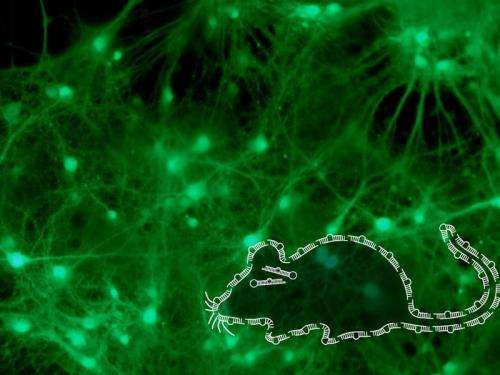MicroRNA molecule modulates behavioural response to stress

Chronic stress influences our mood and behavior. Scientists of the "Max Planck – Weizmann Laboratory for Experimental Neuropsychiatry and Behavioral Neurogenetics" investigated the molecular mechanisms of how the brain reacts to stress. For the first time, they could link changes in the level of the microRNA molecule miR19b in stress-related brain areas to different behavior in mice. These findings may pave the way for a better understanding of the way our brain copes with stress.
Researchers around Alon Chen, Director at the Max Planck Institute of Psychiatry and head of the "Max Planck – Weizmann Laboratory for Experimental Neuropsychiatry and Behavioral Neurogenetics" discovered elevated levels of the molecule miR19b in a specifically stress-related brain area of chronically stressed mice. MicroRNAs, such as miR19b, are very small, non-coding RNA molecules that regulate various cellular activities. In the case of miR19b, the researchers identified the adrenergic receptor beta-1 (Adrb1) as a major target molecule. Thus, higher levels of miR19b result in reduced production of the Adrb1 protein. The adrenergic receptors interact with the stress hormone and neurotransmitter noradrenaline and have been reported to play an important role in memory consolidation.
These data have raised the question whether or not the presence of more miR19b influences the memory of stressful situations in mice. "Using novel site-specific injection and genetic engineering techniques, we could elevate or reduce the level of miR19b exactly in the small, stress-related brain area in mice," explains Alon Chen. Though mice with elevated or reduced levels of miR19b leading to lower or higher levels of Adrb1, respectively, did not show changes in anxiety-like behavior, the scientists observed differences in auditory fear memory. Mice with higher levels of miR19b displayed less stress-induced freezing and better coping, whereas mice with lower levels of miR19b behaved conversely.
"In further experiments we even saw that higher or lower levels of miR19b in the stress-related brain area did not only influence noradrenergic signaling within this region, but also in a distributed system controlling memory consolidation," states Naama Volk, PhD student in Alon Chen's research team and first author of the current study. "Spatial regulation of the protein Adrb1 by miR19b induces an appropriate response in stress conditions enabling the animal to accommodate its behavior to changing situations." These findings may pave the way for a better understanding of the way our brain copes with stress leading to different behavior under different circumstances.
More information: "MicroRNA-19b Associates with Ago2 in the Amygdala Following Chronic Stress and Regulates the Adrenergic Receptor Beta 1." The Journal of Neuroscience, 5 November 2014, 34(45):15070-15082; DOI: 10.1523/JNEUROSCI.0855-14.2014


















